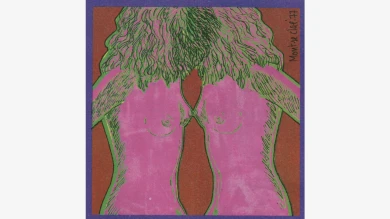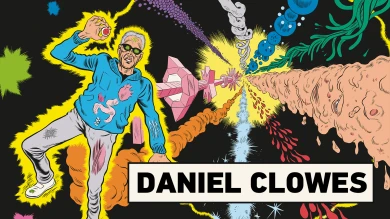-
Tuesday, 13, Wednesday, 14, and Thursday, 15 December 2022 Nouvel Building, Children’s Workshops, Floor -1
Workshop
RegistrationThis workshop explores the reverberations of underground visual culture today, shining a light on the trajectory of draughtswomen and the existence, or not, of genealogies with present-day artists via both theory and practice.
The first session traces a timeline from pioneering women comics artists in Spain to contemporary female fanzine artists and committed graphic art. The second session, conducted by Ángela Fernández del Campo, comprises practical exercises focused on boosting creative and critical meaning by way of different artistic techniques. The third and final session approaches self-management, the root of the DIY concept that makes alternative cultural production possible. It features Yeyei G�ómez, the coordinator of two self-publishing events, Lo hacemos nosotras and Autozine, and Marika Vila, who will share her experience in this sphere.
-
Thursday, 15 December 2022 Nouvel Building, Protocol Room
Round-table Discussion
Tickets—Moderated by: Elisa McCausland
This round table features the participation of some of the most salient figures in Spain’s comix underground, for instance Isa Feu, Marta Guerrero, Laura Pérez Vernetti and Marika Vila, alongside researcher and spokesperson Elisa McCausland. As a coda to the programme, the discussion includes the first-person testimonies of these artists and widens the questions addressed in the previous workshop.
Documents 23. Women Artists from Spain’s Comix Underground
Workshop and Round-table
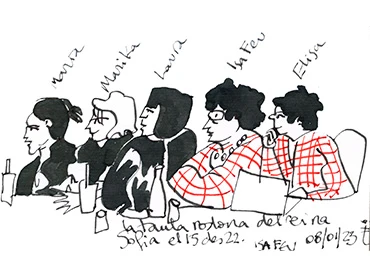
Held on 13, 14, 15 Dec 2022
The Documents programme explores the relationships between art and publishing, exploring themes that include the effects of archive on narratives of art history, the artist’s book and publishing as an artistic practice. This latest edition, comprising a workshop and a round-table discussion, recovers and grants visibility to women artists from Spain’s comix underground.
In the early 1970s in Spain, a vindication of ugliness, seediness and excess arose from a youth disillusioned and stymied by Francoist censorship, framed inside a context marked by the final repressive throes of the dictatorship. Numerous artists developed their work in magazines like El Rrollo enmascarado, El Víbora, Star and countless transgressive fanzines, yet women’s presence remained out of sight. The lack of women cartoonists was coupled with many women’s invisibility, either owing to careers being shelved in the world of comics or for working alongside other artists that ultimately emerged. Thus, this new edition of Documents recovers the work of female cartoonists such as Montse Clavé, Ana Miralles, Núria Pompeia and Mariel Soria, and serves as a prelude to a document-based show on the same theme, to be held in the Museo’s Library and Documentation Centre in 2023.
A workshop coordinated by illustrator Yeyei Gómez and a round-table discission, featuring the participation of artists such as Isa Feu, Marta Guerrero, Laura Pérez Vernetti and Marika Vila, highlight the role these women played in developing Spanish counterculture and in creating new narratives and references from the feminism of the time.
[dropdown]
Isa Feu (1956) is a draughtswoman and comic book artist who regularly contributed to magazines such as Los tebeos del Rrollo, El Víbora and Cavall Fort. She also published illustrations in Diario de Barcelona, La Vanguardia, El Periódico and other periodic publications, and her works have been displayed in the rooms of Metrònom (Barcelona), Amadís (Madrid) and Vinçon (Barcelona). Since 1991, she has worked in film as an assistant set designer.
Ángela Fernández del Campo (1991) is an illustrator and silk-screen printer. She is the founder of the silk-screen printing and illustration workshop La Caverna (Madrid), and is a participant in the Autozine Festival, in Madrid, and a member of publishing collectives such as Turbina Magia and Ediciones Cavernícolas. Moreover, she has participated in self-publishing events like Gutter Fest (Barcelona), Vendetta (Marseille), Hungry Eyes (Berlin) and Tenderete (Valencia). In 2016, she was awarded the CreaCIC (Cuenca) First Prize for Illustration.
Yeyei Gómez (1993) is a draughtswoman and cartoonist who works in the field of editorial illustrations, graphic-art humour and poster art, publishing her work in newspapers such as The New York Times and El Salto and with publishers like Penguin Random House. Her self-published works include Cuaderno de clase (2019), Guy (2017) and Naufragio Universal (2017). In 2021, she was awarded a grant from the Academy of Spain in Rome.
Marta Guerrero (1965) is a draughtswoman, designer and animation director. She was a regular contributor to the magazines ¡¡Al ataque!! and El Víbora, publishing the series Los sonidos del morbo, Sarita and Dolores sus labore. She also made …De ellas (Edicions de Ponent, 2006) and has participated in collective exhibitions that include Brazil Inspiração and El cómic en la democracia española, 1975-2005/6 (Brussels, 2005). In 2017 she premiered the aminated short film El Mag.
Elisa McCausland (1983) is a journalist, critic and researcher specialised in comics. She is a regular contributor to Dirigido por, El Salto and Sofilm, and her most notable publications include Wonder Woman. El feminismo como superpoder (Errata Naturae, 2017) and, with Diego Salgado, Supernovas. Una historia de la ciencia ficción audiovisual (Errata Naturae, 2019) and Sueños y Fábulas. Historia de Vertigo (Ecc Ediciones, 2022). Furthermore, she has curated the exhibition Presentes: Autoras de tebeo de ayer y hoy (Rome, 2016), and promoted Colectivo de Autoras de Cómic (The Collective of Women Comics Artists) and is a member of the Association of Spain’s Comix Critics and Spokespeople.
Laura Pérez Vernetti (1958) is a comics artist, illustrator and photographer. She is a regular contributor to the magazine El Víbora, and has published the albums El toro blanco (La Cúpula, 1989), Las habitaciones desmanteladas (Edicions de Ponent, 1999), El brillo del gato negro (Edicions de Ponent, 2008) and Sarà Servito (Edicions de Ponent, 2010). She has exhibited her work in the Museo de Arte Contemporáneo de Madrid, Es Baluard Museu (Palma de Mallorca) and the Centre de Cultura Contemporània de Barcelona, among others.
Marika Vila (1949) is a comics artist, illustrator, curator and teacher. Her works have been disseminated in Butifarra!, El Periódico de Catalunya, Totem and El Papus, and most notably include the comic strips Si en el día una mujer… ( Troya/Totem), Dossier Amparo Torrego ( Totem) and Mata Hari (Isla de Nabumbu, 2019). She has also received the Homage Prize for her career at the XVIII Salón del Cómic de Getxo (2019), the Honorary Prize from the Colectivo de Autoras de Cómic (The Collective of Women Comics Artists, 2020) and the Girocòmic Prize (2022), among others.
[/dropdown]
Curated by
Raquel Jimeno y Alberto Medina
Organised by
Museo Reina Sofía
Collaboration
Illycaffè and Colectivo de Autoras de Cómic
Programme
Participants
Participants

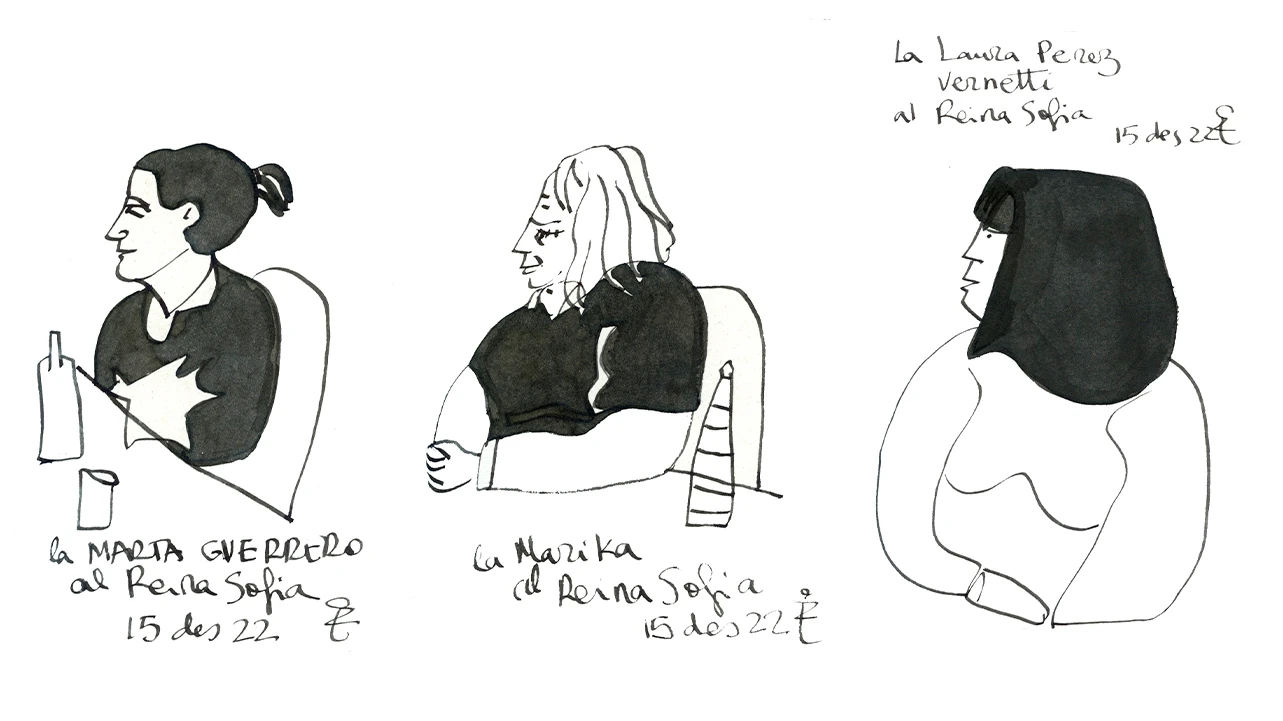


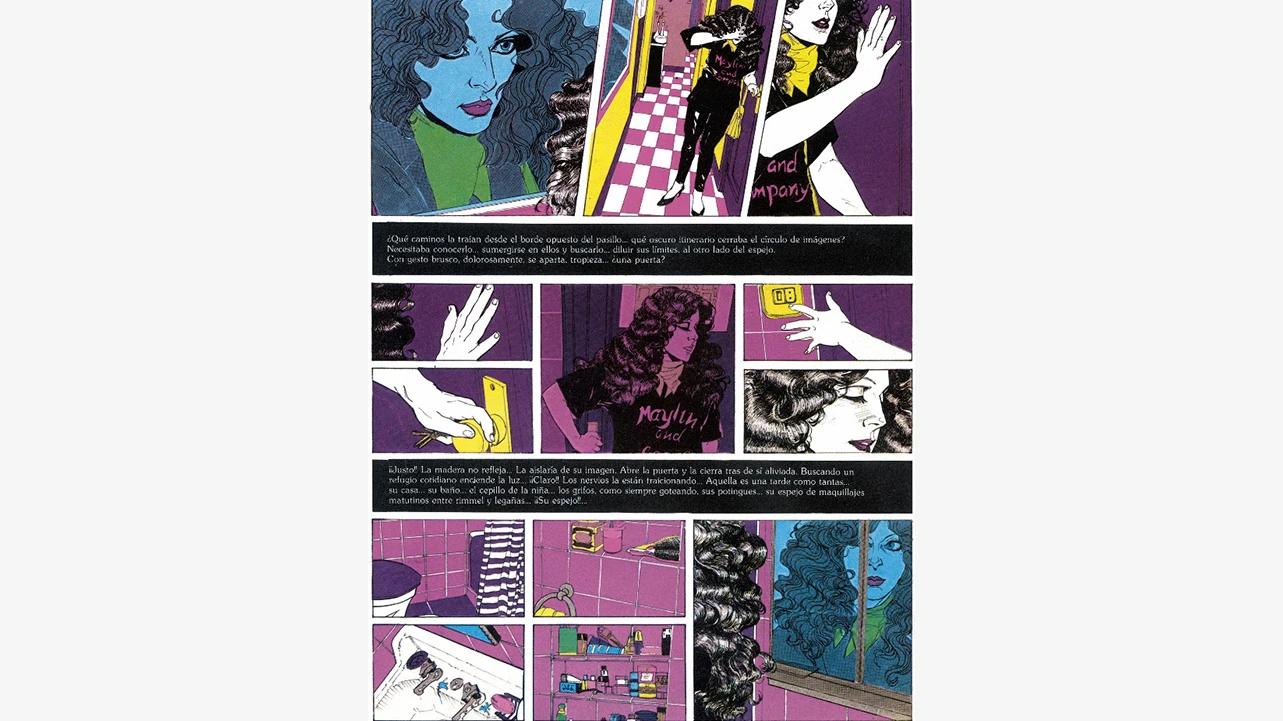
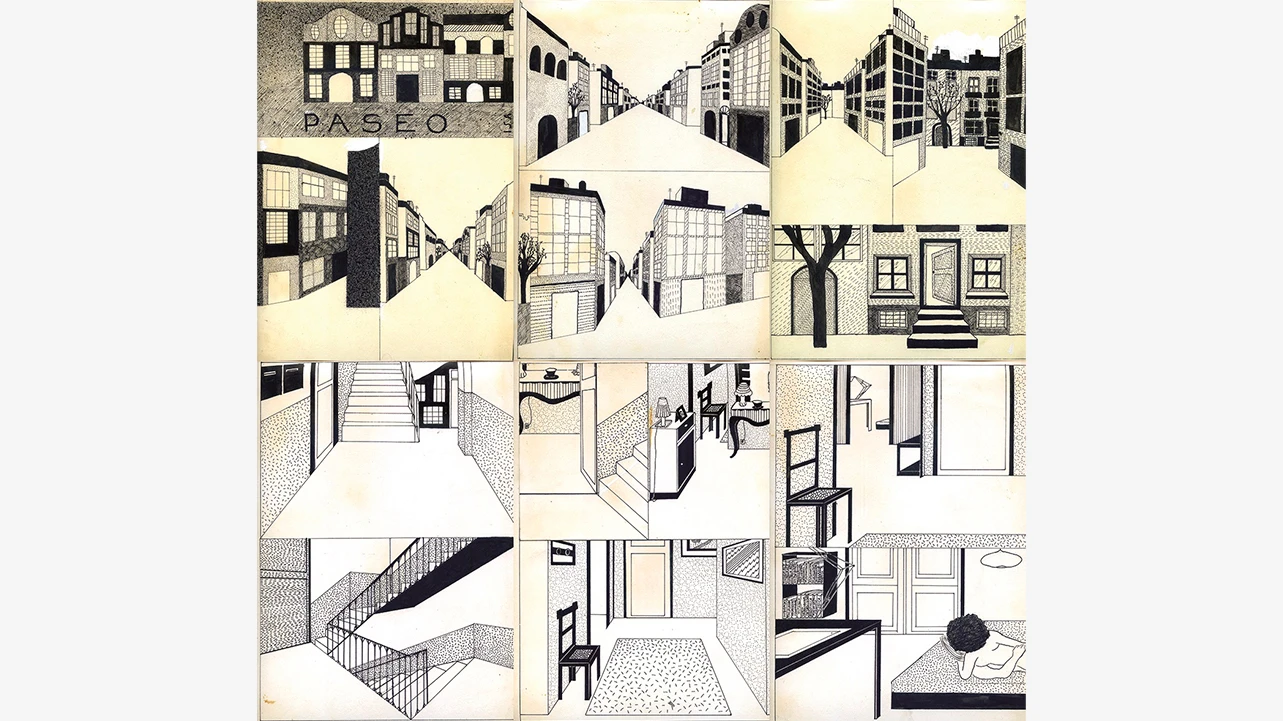
Más actividades

Difficulty. Forms and Political Effects of Deviation in Writing and Contemporary Art
23 February – 14 December 2026 – Check programme
Difficulty. Forms and Political Effects of Deviation in Writing and Contemporary Art is a study group aligned towards thinking about how certain contemporary artistic and cultural practices resist the referentiality that dominates the logics of production and the consumption of present-day art. At the centre of this proposal are the concepts of difficulty and deviation, under which it brings together any procedure capable of preventing artistic forms from being absorbed by a meaning that appears previous to and independent from its expression. By ensuring the perceptibility of their languages, difficulty invites us to think of meaning as the effect of a signifying tension; that is, as a productive and creative activity which, from the materiality of art objects, frees aesthetic experience from the representational mandate and those who participate in it from the passiveness associated with tasks of mimesis and decoding.
The economy of the referential norm translates the social logic of capitalism, where insidious forms of capturing subjectivity and meaning operate. In the early 1980s, and adopting a Marxist framework, poet Ron Silliman highlighted how this logic entailed separating language from any mark, gesture, script, form or syntax that might link it to the conditions of its production, rendering it fetichised (as if without a subject) and alienating its users in a use for which they are not responsible. This double dispossession encodes the political strategy of referential objectivity: with no subject and no trace of its own consistency, language is merely an object, that reality in which it disappears.
The political uses of referentiality, more sophisticated today than ever before, sustain the neoliberal-extractivist phase of capitalism that crosses through present-day societies politically, economically and aesthetically. Against them, fugitive artistic practices emerge which, drawing from Black and Queer studies and other subaltern critical positions, reject the objective limits of what exists, invent forms to name what lies outside what has already been named, and return to subjects the capacity to participate in processes of emission and interpretation.
Read from the standpoint of artistic work, the objective capture of referentiality may be called transparency. Viewed from a social contract that reproduces inequality in fixed identity positions, transparent in this objectivity are, precisely, the discourses that maintain the status quo of domination. Opposite the inferno of these discourses, this group aims to collectively explore, through deviant or fugitive works, the paradise of language that Monique Wittig encountered in the estranged practices of literature. For the political potency of difficulty — that is, its contribution to the utopia of a free language among equals — depends on making visible, first, its own deviations; from there, the norm that those deviations transgress; and finally, the narrowness of a norm which in no way exhausts the possibilities ofsaying, signifying, referring and producing a world.
From this denouncement of referential alienation, fetishisation and capture, Difficulty. Forms and Political Effects of Deviation in Writing and Contemporary Art turns its attention to the strategies of resistance deployed by contemporary artists and poets. Its interest is directed towards proposals as evidently difficult or evasive as those of Gertrude Stein, Lyn Hejinian, Theresa Hak Kyung Cha, Kameelah Janan Rasheed, Kathy Acker, María Salgado and Ricardo Carreira, and as seemingly simple as those of Fernanda Laguna, Felix Gonzalez Torres and Cecilia Vicuña, among other examples that can be added according to the desires and dynamics of the group.
The ten study group sessions, held between February and December, combine theoretical seminars, work with artworks from the Museo Reina Sofía’s Collections and exhibitions, reading workshops and public programs. All these formats serve as spaces of encounter to think commonly about certain problems of poetics — that is, certain political questions — of contemporary writing and art.
Difficulty. Forms and Political Effects of Deviation in Writing and Contemporary Art inaugurates the research line Goodbye, Representation, through which the Museo Reina Sofía’s Studies Directorship seeks to explore the emergence of contemporary artistic and cultural practices which move away from representation as a dominant aesthetic-political strategy and redirect their attention toward artistic languages that question the tendency to point, name and fix, advocating instead for fugitive aesthetics. Over its three-year duration, this research line materializes in study groups, seminars, screenings and other forms of public programming.

27th Contemporary Art Conservation Conference
Wednesday, 4, and Thursday, 5 March 2026
The 27th Contemporary Art Conservation Conference, organised by the Museo Reina Sofía’s Department of Conservation and Restoration, with the sponsorship of the Mapfre Foundation, is held on 4 and 5 March 2026. This international encounter sets out to share and debate experience and research, open new channels of study and reflect on conservation and the professional practice of restorers.
This edition will be held with in-person and online attendance formats, occurring simultaneously, via twenty-minute interventions followed by a five-minute Q&A.
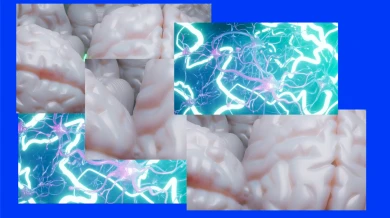
Cultural Work
Thursday, 12 February 2026 – 5:30pm
This series is organised by equipoMotor, a group of teenagers, young people and older people who have participated in the Museo Reina Sofía’s previous community education projects, and is structured around four themed blocks that pivot on the monstrous.
Session number two looks to approach film as a place from which cultural work is made visible and processes of production engage in dialogue with artistic creation. From this premise, the session focuses on exploring how audiovisual content is produced, assembled and distributed, from the hands that handle the images to the bodies that participate in its circulation. The aim is to reflect on the invisible effort, precarity and forms of collaboration that uphold cultural life, that transform the filmic experience into an act that recognises and cares for common work.

Alberto Greco. Viva el arte vivo
Tuesday, 10 February 2026 – 7pm
In conjunction with the opening of the exhibition Alberto Greco. Viva el arte vivo, Fernando Davis, the show’s curator, and Amanda de la Garza, the Museo Reina Sofía’s deputy artist director, will converse in the Nouvel Building’s Auditorium 400 on the life and work of the Argentinian artist, a core figure in experimental avant-garde art.
The title of both exhibition and conversation originates from the proclamation “Long Live Arte Vivo” Alberto Greco (Buenos Aires, 1931— Barcelona, 1965) disseminated around the streets and on the walls of Rome. For Greco, arte vivo was an art of the future, an art based on a set of irreverent and untimely gestures, of adventures open to unpredictability melding with life, and which began in 1962, prior to his coining of the term “vivo-dito”. In his Manifiesto dito dell´arte vivo (Dito Arte-Vivo Manifesto), which he pasted on the walls of Genoa, Greco encouraged new contact “with the living elements of our reality: movement, time, people, conversations, smells, rumours, places, situations”. He would also burst into the everyday of Madrid’s streets as he convened a “vivo-dito moment”, culminating in the burning of a canvas painted collectively in Madrid’s Lavapiés neighbourhood.
In addition to founding arte vivo, Alberto Greco was an informalist painter, a queer flâneur, a poet and sometime actor. This intense journey of Greco’s life and art is closely connected to the migrant route he embarked upon in 1950 in Buenos Aires, taking in Atacama and Humahuaca, Paris, Rio de Janeiro, São Paulo, Genoa, Rome, Madrid, Piedralaves, New York and Ibiza and ending abruptly in Barcelona, where he took his own life shortly after writing his final great work, the novel Besos brujos (Bewitching Kisses, 1965).
These inaugural conversations, part of the main working strands of the Museo’s Public Programmes Area, aim to explore in greater depth the exhibition narratives of the shows organised by the Museo from the perspective of artists, curators and specialists.
![Basel Abbas y Ruanne Abou-Rahme, At Those Terrifying Frontiers Where the Existence and Disappearance of People Fade Into Each Other [En esas fronteras aterradoras donde la existencia y la desaparición de personas se disuelven entre sí], 2019](https://recursos.museoreinasofia.es/styles/small_landscape/public/Colecci%C3%B3n/abbasabourahme.png.webp)
Gaza and Aestheticide
Tuesday February 10, 2026 – 16:00 h
“This seminar examines the systematic destruction of Palestinian collective sensibility — what we might call ‛aestheticide’ — that has accompanied Israel’s genocide and ecocide in Gaza, and considers the conditions of artistic practice in its aftermath. Over more than two years, the demolition of universities, archives, museums, and libraries has not only erased cultural and intellectual infrastructure but has also targeted the very possibility of representation itself. The destruction of a people has been accompanied by the destruction of their image, their history, and their capacity to be known: reportage, scholarship, and cultural memory have been deliberately undermined, with media institutions, universities, and museums often complicit in this repression. Gaza consequently functions as a rehearsal space for a possible global future — of fascism, post-liberal authoritarianism, militarized borders, and AI-enabled warfare —, a laboratory for an emerging world order. What, then, becomes of critical analysis and resistance under these conditions? And what becomes of aesthetics and politics?”
—T.J. DemosThis seminar takes place thanks to the art historian’s invitation to Spain by the Miró Foundation. In the context of the museum, it engages in dialogue with a broader line of work on the climate emergency and decolonial perspectives developed within the Museum of the Commons project (2023–2026) of the L’Internationale network, of which the Museo Reina Sofía is a member; as well as with some of the questions that animate the study group Aesthetics of Peace and Desertion Tactics. Finally, it is also embedded in a wider strategy of support for and commitment to the artistic and discursive practices of Palestinian artists and cultural practitioners, most clearly reflected in the TEJA network.
